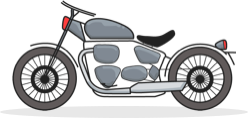Safety Warning
SAFETY PRECAUTIONS FOR MOUNTING RACING AND COMPETITION TYRES
TYRE MOUNTING IS DANGEROUS AND MUST BE DONE ONLY BY SPECIALLY TRAINED PROFESSIONALS USING PROPER TOOLS AND PROCEDURES. FAILURE TO FOLLOW THESE PRECAUTIONS CAN RESULT IN SERIOUS PERSONAL INJURY OR DEATH.
ALWAYS mount tyres only on rims which are undamaged, smooth and clean.
ALWAYS be sure the rim diameter matches the nominal tyre diameter. The bead diameter must be exactly the same as the diameter of the rim on which it will be mounted. The beads cannot be forced out against rim flanges by using more air pressure because this will break the beads, and the tyre will explode with force sufficient to cause serious injury or death.
ALWAYS be sure both beads and rim flanges are adequately lubricated with an approved mounting lubricant. A "solid" soap is recommended to prevent moisture entering the inside surfaces of the tyre.
NEVER force the bead(s) over the rim flange or use sharp-edged or improper tools that could damage the bead(s) or other parts of the tyre. When passing tyre beads over the rim flange, ensure as much as possible of the bead already over the rim flange is sitting in the wheel well.
ALWAYS inflate tyres in a safety cage or with another restraint device.
ALWAYS inflate the tyre without the valve core inserted into the valve stem. Inflation air should be as dry as possible.
ALWAYS use a clip-on chuck connected to an extension hose attached to a hand air pressure regulator incorporating a pressure gauge, when inflating and/or seating beads. NEVER use a clip-on chuck connected directly to an air supply when inflating and/or seating beads.
NEVER stand next to or lean over the tyre and rim while inflating.
NEVER inflate beyond 40 psi to seat the beads.
ALWAYS after seating the beads, insert the valve core (strong spring-type) and adjust operating inflation pressure. Conditions affecting inflation pressure vary from circuit to circuit. Cooper Tire & Rubber Company Europe Sales Engineers can offer guidance on optimum performance inflation pressures. Tyres must always hold enough inflation pressure to avoid distortion or rolling under during cornering.
Cooper Tire & Rubber Company Europe does not recommend using tyre pressure regulating valves, because they can lead to under-inflated tyre operation and sudden tyre destruction.
NEVER apply direct heat or perform "hot work" on any wheel fitted with an inflated tyre, because explosions can occur. Tyres inflated with nitrogen do not make hot work safe.
ONLY specially trained Cooper Tire & Rubber Company Europe-approved personnel can hand-cut tyre patterns.
NEVER modify any portion of an Avon racing or competition tyre, for example, by chemically treating the tread compound ("soaking" or "softening" the tread). Any modification could result in premature or catastrophic tyre failure with personal injury or death the result.










